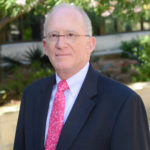 Thursday, June 20th – Special Committee Meeting
Thursday, June 20th – Special Committee Meeting
The U.S. Department of State maintains the International Visitor Leadership Program, which exposes participants to a range of policy views in the public and private sectors. A group is visiting Des Moines in June. The Iowa International Center invited the Committee to host this group, from Bulgaria, Estonia, Germany, Sweden, Turkey, and the United Kingdom, most of whom are editors or journalists. They are not experts on U.S. foreign policy, but we expect them to be knowledgeable and able to share the views of the people in their countries. We have not hosted a group like this in recent years, so we are not entirely sure what to expect. Nevertheless, we anticipate a very interesting discussion, one in which panel members may solicit your views on various issues.
Bulgaria – Mr. Nikola Antonov MITOV
Chief Expert, International Department, Bulgarian Socialist Party
Estonia – Ms. Olesja LAGASINA
Editor-in-Chief, Postimees (Russian language edition)
Germany – Ms. Antje SCHIPPMANN
Editor, BILD
Sweden – Mr. Martin HENRIKSSON EKENSTEEN
U.S. and NATO Desk Officer, The Swedish Joint Headquarters
Turkey – Ms. Betul BERISE
Foreign News Editor, Cumhuriyet daily
United Kingdom – Ms. Paula Leslie HARRISON
Deputy Head of Department, Cyber Security, Foreign and Commonwealth Office
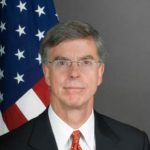 May 15th, 2019 – Ambassador William Taylor
May 15th, 2019 – Ambassador William Taylor
Ambassador Taylor is currently the executive vice-president at the U.S. Institute for Peace. Earlier he was the special coordinator for Middle East Transitions in the U.S. State Department. He served as the U.S. ambassador to Ukraine from 2006 to 2009. He is a graduate of West Point and Harvard University’s Kennedy School of Government. He served as a combat company commander in the U. S. Army in Vietnam and Germany.
 April 24th, 2019 – Dr. Maria Filippone
April 24th, 2019 – Dr. Maria Filippone
Dr. Maria Filippone is a Family Medicine Specialist in Des Moines, IA.
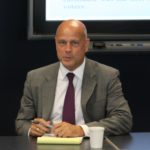 February 12th, 2019 – Thomas Garrett
February 12th, 2019 – Thomas Garrett
Mr. Garrett brings more than three decades of experience in the field of politics and advocacy. Most recently, he supported reformers and democrats across the world with his work at the International Republican Institute (IRI), a nonprofit, nonpartisan organization that supports democracy, civil society, women and youth political empowerment and democratic governance in more than 80 countries.
Thomas E. Garrett joined IRI in 1994, first serving as a resident program director in Ukraine and overseeing democracy strengthening programs in Ukraine, Belarus and Moldova. He left the region in 2000 to serve as IRI’s resident advisor to Mongolia’s parliament and later moved to Indonesia to oversee a program of political party, public opinion research and support to local government. Returning to Washington, D.C., he was regional director for Middle East and North Africa and, in 2009, he was made vice president for programs, responsible for a global portfolio of over 200 staff in offices in 32 countries.
Over the past 23 years, Garrett directly led more than 325 training programs on topics relating to political participation. He worked on election observation missions in Afghanistan, Albania, Azerbaijan, Egypt, Mali, Mongolia, Pakistan, Russia, the Solomon Islands, Timor-Leste, Tunisia and Ukraine.
He holds a master’s degree in diplomacy and international relations and undergraduate degree in political science.
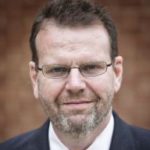 January 29th, 2019 – Dr. Robert Farley
January 29th, 2019 – Dr. Robert Farley
Dr. Robert Farley has taught security and diplomacy courses at the Patterson School of Diplomacy and International Commerce at the University of Kentucky since 2005. He is currently a visiting Professor at the US Army War College. He received his BS from the University of Oregon and his M.A. and Ph.D. from the University of Washington. At the Patterson School, Dr. Farley has taught courses on a wide-range of subjects, including Asian Politics and Security, Counter-Insurgency, European Security, US-China Foreign Relations, and International Conflict.
Dr. Farley is the author of Grounded: The Case for Abolishing the United States AirForce and Battleship Book. He has contributed chapters to books on the US Air Force, US naval doctrine, Chinese naval history, and trade secrets. He has also been published in numerous academic journals and contributed Op-Eds on topics such as intellectual property and cybersecurity, military strategy and doctrine, and more recently, trade issues between the US and China. Dr. Farley has also been interviewed on a variety of news programs.
Dr. Farley will be talking about some of the unique challenges associated with managing trade relations between the US and China.
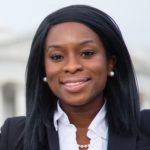 December 18th, 2018 – Laura Kupe
December 18th, 2018 – Laura Kupe
Laura Kupe is a policy analyst at the RAND Corporation. She most recently served as a special assistant at the Department of Homeland Security (DHS) in the Office of International Engagement within the Office of Policy. In her role, Kupe served as a subject-matter expert on the Department’s engagement with European Union member states and the Five Eyes on topics including immigration/migration, border security, and counterterrorism. Before that, she was detailed to the Office of Presidential Personnel in the White House and served as domestic director, working with the Departments of Justice, Housing and Urban Development, Health and Human Services, Labor, and Education on personnel matters and presidential appointments. Before her detail, Kupe served as the briefing book coordinator to DHS Secretary Jeh Johnson. Prior to her time in the federal government, Kupe served as a legislative fellow for Congresswoman Karen Bass, Ranking Member of the Africa Subcommittee on the House Foreign Affairs Committee. She graduated with a B.A. from the University of Michigan and a J.D. from the University of Michigan Law School. Kupe speaks German, French, and Luxembourgish.
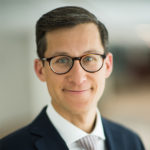 November 28th, 2018 – Blaise Misztal
November 28th, 2018 – Blaise Misztal
Blaise Misztal is the director of BPC’s national security program. He previously served as the project’s associate director and senior policy analyst. At BPC, Misztal has researched a variety national security issues, including Iran and its nuclear program, Turkey, cybersecurity, stabilizing fragile states, and public diplomacy in the 21st century. He has testified before Congress and published op-eds in The Washington Post, The Wall Street Journal, The Weekly Standard, The New Republic, and Roll Call. In addition, Misztal wrote and directed the 2009 “Cyber ShockWave” simulation that aired on CNN.
Prior to joining BPC, Misztal spent a year as a Nuffield Fellow at Nuffield College, Oxford University. He was selected as a future leader by the Foreign Policy Initiative in 2010 and named as a national security fellow by the Foundation for Defense of Democracies in 2011.
Misztal is currently completing his Ph.D. in political science at Yale University, where his research focuses on the relationship between democracy, liberalism, and social stability. He holds an M.Phil. in political science from Yale and an A.B. with honors from the University of Chicago.
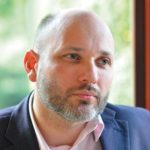 October 17th, 2018 – Dr. James Smith
October 17th, 2018 – Dr. James Smith
James Smith is a co-founder of the UK National Holocaust Centre along with his brother Stephen and parents.
During the Kosovo crisis in 1999 he was a volunteer physician with the International Medical Corps (He was a trainee surgeon, having qualified as a medical doctor in Leeds, 1993). The late, costly and destructive international response to the ethnic cleansing Kosovo Crisis convinced James that the public health approach to the prevention of diseases should be applied to the prevention of genocide.
James co-founded the Aegis Trust in 2000 and remains the Chief Executive Officer. In 2002 he staged the first major international conference on genocide prevention with the UK Foreign Office (held at The Holocaust Centre).
In 2004, working with the Rwandan Government and Kigali City Council, he played a key role in establishing the Kigali Genocide Memorial in Rwanda’s capital, at a site where some 250,000 victims of the 1994 genocide lie buried. It receives tens of thousands of visitors each year, world leaders among them.
James visited Darfur in 2004 and led Aegis Trust’s campaign to limit the crimes against humanity in the region. He has subsequently revisited both Sudan and South Sudan.
The Peace Education programme led by Aegis Trust in Rwanda is now being applied as a tool for prevention by community leaders in countries at-risk of mass atrocities, notably in Central African Republic, South Sudan and Kenya.
James is the President of the UK National Holocaust Centre. He was awarded the CBE in the New Years Honours List in 2014 for services to Holocaust education and genocide prevention.
September 25th, 2018 – Matthew Rooney
Matthew Rooney joined the Bush Center in June 2015 following a career as a Foreign Service Officer with the U.S. Department of State. At postings in Washington and abroad, he focused on advocating market-driven solutions to economic policy challenges in both industrialized and developing countries, and on protecting the interests of U.S. companies abroad.
In Washington, Rooney was on loan to the U.S. Chamber of Commerce to create a high-level private sector advisory body for the Summits of the Americas, working closely with the U.S. private sector and with companies and business associations from throughout the Americas to negotiate an agenda to promote economic integration in the region. Previously, he was Deputy Assistant Secretary responsible for relations with Canada and Mexico and for regional economic policy. In prior Washington assignments, Rooney worked for then-Senator Fred Thompson, and supported negotiations to open global markets to U.S. airline services.
Abroad, Rooney was Consul General in Munich, a Consulate General providing a full range of Consular and export promotion services, supporting a permanent presence of 30,000 U.S. forces in two major base complexes, and carrying out a media and public relations initiative in support of U.S. diplomatic objectives in Germany. As Counselor for Economic and Commercial Affairs at the U.S. Embassy in San Salvador, El Salvador, he laid the groundwork for free trade negotiations between the United States and the five countries of Central America, and promoted market-based reforms for electrical power. Prior to this, he served in various posts in Germany, Gabon and Côte d’Ivoire.
Rooney studied Economics, German and French at the University of Texas at Austin and received his Master’s Degree in International Management at the University of Texas at Dallas.

